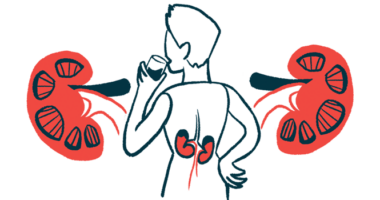Expert panel publishes first holistic care guidelines for hATTR patients
Focus of new recommendations is multidisciplinary care, support

An international panel of patient advocates and healthcare providers has published the first set of recommendations outlining steps for the holistic care of people living with hereditary transthyretin-mediated amyloidosis (hATTR), a group of disorders that includes familial amyloid polyneuropathy (FAP).
The guidelines focus not only on early diagnosis and treatment, but also on other aspects of multidisciplinary care, including psychological support and individualized, family-centered care plans that help patients to feel supported and maintain their independence.
“These recommendations provide healthcare professionals with a new blueprint for care that can potentially have a significant impact on a patient’s quality of life,” Laura Obici, MD, co-chair of the panel and a physician at the Amyloidosis Research and Treatment Center at the IRCCS Fondazione Policlinico San Matteo, in Italy, said in a press release from Alnylam Pharmaceuticals. The company, which markets the approved hATTR therapies Onpattro (patisiran) and Amvuttra (vutrisiran), funded the creation of these recommendations.
“We must start to think beyond treating a patient’s symptoms to other allied healthcare services that can help with the physical, psychological, social, and spiritual aspects of living with this disease,” Obici said.
The full set of guidelines were described in a new study, “Consensus recommendations on holistic care in hereditary ATTR amyloidosis: an international Delphi survey of patient advocates and multidisciplinary healthcare professionals,” published in BMJ Open.
Aim is better care for patients with all hATTR types, including FAP
In all forms of hATTR, mutations in the TTR gene cause the buildup of an abnormal version of the transthyretin protein in the body’s tissues, disrupting their normal function. In FAP, which is marked by abnormal sensations in the hands and feet, such as numbness, tingling, or burning, the nerves outside the brain and spinal cord are primarily affected.
Given the complexity and severity of hATTR, all aspects of a patient’s life may be affected, highlighting the need for multidisciplinary care.
But as with many other rare diseases, there are no universal standards for holistic care of these patients. Indeed, healthcare practices and resources vary widely between countries and institutions.
To address this care gap, a primary consensus panel was established in 2020 to develop these guidelines. The panel involved 14 members from eight countries — representing patients, patient advocacy groups (PAGs), medical professionals in key clinical specialties, and Alnylam.
This group developed a sweeping set of 50 care recommendations that spanned seven key goals. These included early diagnosis and treatment access (16%), disease monitoring and organization of care (26%), maintenance of physical and mental health (36%), family-centered care and caregiver support (6%), patient-healthcare provider dialogue and shared decision-making (6%), access to community support (4%), and spiritual support/social networks (6%).
Guidelines included topics such as mandatory genetic testing and counseling, an immediate start to treatment, better psychological support and reduced stigma, support and genetic testing for family members who may be affected by the disease, and open discussion with patients that help them maintain autonomy and participate in care decisions.
Also emphasized was a need for resources to help patients with financial planning, social support, and expanding palliative care services.
“I am so proud to have contributed to the development of these recommendations so that they reflect not only my experience as someone living with the condition, but those of the broader patient community,” said Rosaline Callaghan, a panel co-chair and the founder of Amyloidosis Ireland, a voluntary advocacy group.
“These recommendations underscore the importance of more robust holistic care plans to bring us one step closer to ensuring people living with hATTR amyloidosis are empowered to live life to the fullest,” Callaghan added.
After their creation, the recommendations were voted on via an online survey by a larger, international group of experts. Among them were 100 healthcare providers (82%) — mostly from specialist centers that treat hATTR patients — and 22 patient advocacy group representatives (18%) from 27 countries. Most of them were European.
This group endorsed all but one of the 50 recommendations, with an endorsement defined as support from at least 75% of the members. The one not agreed upon was related to the role of complementary therapies as part of self-care, which earned agreement by 70.5%.
hATTR patient advocates report many practices lacking in real life
The group members were asked the degree to which these recommendations are now employed in clinical practice.
About one-third or 35% of the 49 guidelines were identified by most healthcare providers as a core part of routine care at their institution. But the researchers noted that “differing experiences across specialist centers meant that the level of implementation of the recommendations in practice was relatively low compared with level of consensus.”
Moreover, the patient advocate members said they weren’t seeing most of these practices in play
“[These] representatives reported a lower implementation in practice for all core themes except for occupational therapy, psychological support and spiritual support/social networking,” the researchers wrote.
Many guidelines were considered attainable with available resources. However, others were deemed only achievable with more funding or a reorganization of care.
These are the first published recommendations to recognize the value of representatives from the patient community in advocating for the clinical, social and spiritual needs of people affected by [ATTR] amyloidosis.
Following the review, the original draft committee met again to finalize the 49 endorsed recommendations.
Altogether, “these are the first published recommendations to recognize the value of representatives from the patient community in advocating for the clinical, social and spiritual needs of people affected by [ATTR] amyloidosis,” the researchers wrote.
Claudia Cravesana, interim head of international medical affairs at Alnylam, said that “collaboration from all parts of the community will be key to further improve clinical practice.”
The experts hailed from 27 countries across diverse geographic regions, the researchers noted.
“We hope that this study will encourage further discussion and guidance on how to develop services to address the complex needs of those affected by this rare disease,” the team wrote.








